Equity, Diversity, and Inclusion Team
Who are you?
For our team bios, we took a different approach to introducing ourselves. This was done with the recognition that the way we present ourselves in the work environment often centres our professional experience, our education, and our job titles, leaving out important aspects that speak to our whole selves and our relationships with the land and with others. We wanted to disrupt this more colonial practice with some alternative questions.
We took inspiration from Ta7talíya Michelle Nahanee’s “Decolonize...” workbook which asks, “Who are you?”, “Who are your people?”, “Whose land cares for you?” and “Whose land did you grow up on?”. We also felt that it was important to share more about each of our identities with a social positioning statement, outlining the lens and lived experience we show up within equity, diversity, and inclusion work. Our last question asks us how we rest and recharge, focusing on a successful work/life balance and acknowledging that we are much more than just the work we do here at snəw̓eyəɬ leləm̓.
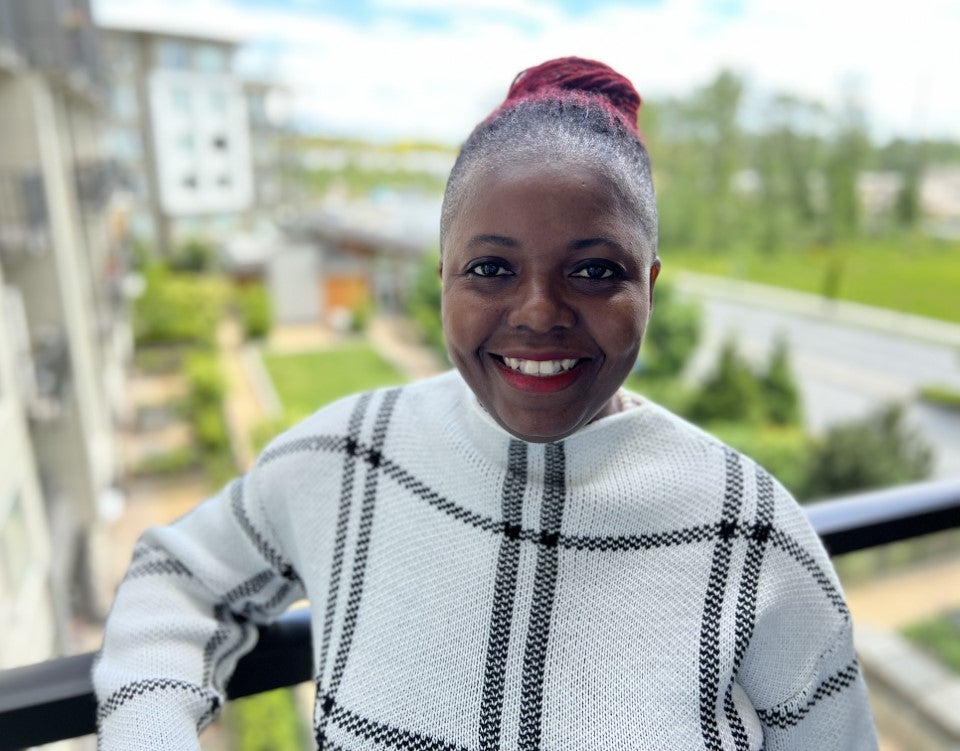
Joy Walcott-Francis
Director, Equity, Diversity, and Inclusion
Hello everyone! My name is Joy Walcott-Francis and I use the pronouns, she/her. You can hear the pronunication of my name here. I am a first-generation immigrant to Canada, and throughout my academic journey, was a first-generation student.
Bio
My roots
My home country Jamaica, named Xaymaca (land of wood and water) by the Tainos people of South America, the island’s original inhabitants pre-European contact and erasure. Since migrating to Canada, I have lived, worked, learned, and been given the opportunity to recharge on the unceded and ancestral homelands of the Coast Salish people, who have cared for these lands since time immemorial and to whom, I am grateful. I locate myself on these lands as a daughter and descendant of people who were stolen from their homelands, forced across the Atlantic, made to endure the horrors of the middle passage and the hardship of enslavement, and some of whom, despite it all, survived to afford me the privileges that I have today.
My work
I am currently the Director, Equity, Diversity, and Inclusion here at snəw̓eyəɬ leləm Langara College. Prior to this role, I have occupied instructional roles both here at Langara and at Simon Fraser University. However, my passion for engaging in equity work within an academic institutional context, comes from experiences of having to navigate post-secondary institutional spaces as a woman of colour and witnessing first-hand, the inequities that need to be addressed.
Soulfood
Outside of work, I enjoy going for weekend hikes that lead to a waterfall, a lake or a view. But more than anything, what really feeds my soul is a good Caribbean party and participating in Caribbean Carnival celebrations, “a festival and celebration tied to freedom and the emancipation of slavery”, celebrated by many Caribbean communities across the globe.
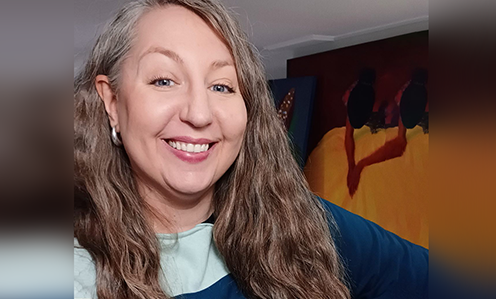
Erin Smith
Sr. EDI Advisor
Hello everyone! I’m Erin Smith and my pronouns are she/her. You can hear the pronunciation of my name here. I speak only English, but have studied in some capacity French, Spanish, Italian, Korean, Mongolian, and Arabic.
Bio
My roots
My great grandparents were born in Ireland and Norway, eventually finding their way to Manitoba and Saskatchewan where my grandparents and then parents were born. This situates me as a third-generation settler here in Canada. I grew up on Treaty 6 territory which is the land of the Blackfoot, Plains Cree, Stoney, Metis, Tsuut’ina and Cree people in central Alberta. I was part of a typical farming community that was shaped particularly by Polish and Ukranian cultural influences, especially in the small town where I was bussed in to attend school.
After more than a decade abroad as a teacher, I came back to Canada in 2016, choosing to move to Vancouver where I now live and work on the traditional, ancestral, unceded, and present-day territory of the xʷməθkʷəy̓əm (Musqueam) First Nation. Having grown up in the land of wheat fields, 10-foot snow drifts, and big sky country, I still find it incredible to wake up to the sound of seagulls, be able to smell the sea air, and pass by a tree in the rainforest bigger than I ever thought possible. I am deeply grateful to the Musqueam people and the other First Nations communities in this area for their ongoing stewardship of this land.
In society
As for my social positioning, I would say that most of my identities are located within the dominant cultural norms here in Canada. I am white, CIS gender, heterosexual, generally able-bodied, and I think fairly neurotypical. I was born into and am still considered middle class, have a graduate degree, and if you don’t look too closely at my hair or listen too closely to my knees, am still considered “young”. With this positioning I hold tremendous power and privilege in many areas of my life. For example, the intergenerational wealth that has been passed down to me is significant. Not in terms of money in my bank account, but wealth in broader terms of what owning and selling land in Canada meant for a childhood of stable relationships, housing, income, food security, reliable transportation and health care. This is in addition to other pathways around education, work, and social networks that were relatively obstacle-free because of white supremacy and other dominant power structures that have directly benefitted and continue to benefit folks like me.
With all my privileges, I’m also a plus-size woman with a recent chronic health condition that affects my day-to-day life. My positionality in these identities routinely reminds me of how and where this world isn’t made with me in mind– whether we’re talking about reproductive rights, beauty standards, expectations around productivity in a capitalist society, or finding a pair of shoes that fit me in a regular store. But even in these identities, my dominant social positioning infiltrates to make these areas easier to navigate and “be”.
Rest and recharge!
For me the need to rest and recharge has become less of an option and more of a necessity in recent years. I have to prioritize this over most other things in my life in order to function. I have found a great meditative practice in painting and if I’m not doing that, I’m absolutely working my way through the latest Korean drama. Reccommendations given and welcome!
My work
I currently support the Office of Equity, Diversity, and Inclusion in a few different ways. I facilitate intercultural and EDI training for multiple student groups on campus and consult on various initiatives across different departments with a professional lens that bridges intercultural and social justice frameworks. I’m also currently working toward the UBC Certificate in Equity, Diversity and Inclusion (EDI), and hold a masters from Royal Roads in International and Intercultural Communication. As to what brings me to this work, I would have to say a strong sense of responsibility to leverage the power and privilege that come with my identity. I hope to focus on enacting change and keeping accountability to relationships with those in communities outside dominant social norms.
I'm always seeking out personal and professional learning opporortunites with the intention of better supporting my colleagues and of mitigating any harm I may enact or contibute to in my lack of lived experience or knowledge around important EDI issues. This is done with the awareness of the inherent privilege in gaining this learning and more often times unlearning through a more formal academic process.
So if you are someone in the Langara College community with similar identities to me (or not :)) and are curious and also a little uncomfortable about engaging in conversations around intercultural or EDI-related topics, I welcome holding space for those discussions. Let's chat! (erinsmith [at] langara.ca (erinsmith[at]langara[dot]ca))
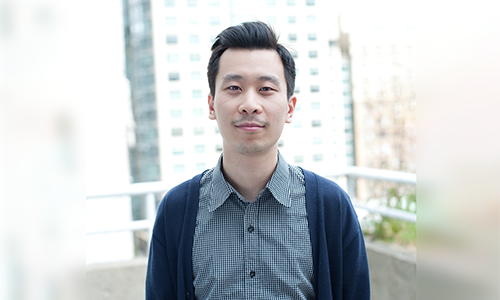
Daniel Lee
Project Assistant
Hi, I'm Daniel Lee and my pronouns are he/him/his. You can listen to the pronunciation of my name here. My ancestors are Chinese and I speak English and Cantonese. The land I grew up on and am still living on in East Vancouver, which is situated on the unceded, traditional territories of the xʷməθkʷəy̓əm (Musqueam), Sḵwx̱wú7mesh (Squamish), and səlilwətaɬ (Tsleil-Waututh) Nations.
Bio
In society
I have only recently started to unpack my lived experiences as a CIS-gender Asian man growing up in the pacific northwest. I often reflect on the liminality of my social positioning, being able-bodied and neurotypical for the most part, while also coming to terms with my biases, and model minority behaviour, which stems from the influence of white supremacy culture.
My work
I am currently the Project Assistant for the Office of Equity, Diversity, and Inclusion. I provide administrative and operational support, whether it be scheduling, organizing, maintaining, record keeping and updating all matters EDI related.
My journey into the EDI field began when I was working as a Teaching and Curriculum Development Centre (TCDC) Department Assistant in 2018. In 2019, I had the opportunity to start a new role within TCDC as a Project Assistant with a focus on Intercultural Initiatives. Shortly after, I joined the Centre for Intercultural Engagement (CIE) in late 2019-early 2020 and continued to support the intercultural work being done at the college. Then in the fall of 2021, my work at CIE underwent a gradual shift from an intercultural to an EDI focus. I am glad to be working under the leadership of the EDI Director and feel excited to be a part of the process of building an EDI strategic and action plan at Langara!
Rest and Recharge
I rest and recharge by exploring the Strathcona neighbourhood and Vancouver Chinatown on foot and supporting small businesses along the way!
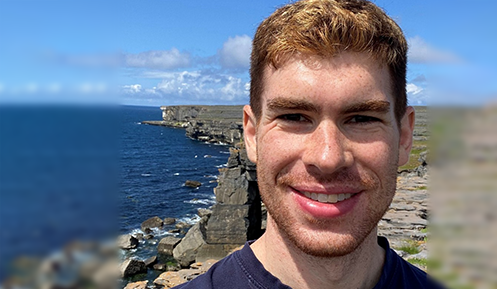
Drew Danelesko
EDI Coordinator
Hi all! My name is Drew Danelesko and my pronouns are he/him. The pronunciation of my name can be heard here. I am fluent in English, but also speak conversational Spanish, German, and Portuguese.
Bio
My Roots
My ancestors are Metis, Ukrainian, Irish, German, Dutch, and Norwegian, meaning I have both Indigenous and settler heritage, but my childhood was largely shaped by Ukrainian culture and traditions from my father’s family. My Metis ancestors lived on Lac Ste. Anne, in one of the first Metis villages in what later became Alberta. My Metis grandmother was disconnected from her family, community, and culture after she married my Ukrainian grandfather. Her assimilation was encouraged by patriarchal, anti-Indigenous, and familial forces. I have found this to be a common experience for many Metis from my generation, meaning that we are reconnecting with our Indigeneity and are often the first generation to do so. I feel an exceptional amount of pride to honour my Metis ancestors, elders, and culture everyday and strive to continually deepen Indigenous ways of being in myself and others. I am a citizen of the Metis Nation of British Columbia.
I was born on the traditional Treaty 7 territory whose signatories include: the Piikani Nation, Kainai Nation, Iethka Stoney Nakoda Nation, consisting of the Chiniki, Bearspaw and Good Stoney Bands and the people of the Tsuut’ina Nation who lands are where Calgary is now located. I moved to the traditional, ancestral, and unceded territory of the xʷməθkʷəy̓əm (Musqueam), Sḵwx̱wú7mesh (Squamish), and səlilwətaɬ (Tsleil-Waututh) nations, now known as Vancouver, in 2014 as an uninvited guest. I am endlessly grateful for the xʷməθkʷəy̓əm’s stewardship of this land. Prior to my move to Vancouver, I also lived in Germany, Brazil, and Hong Kong.
In Society
I am socially positioned as a white passing Indigenous person who is also a descendant of settlers. This has provided me with immense privilege in our white supremist Canadian culture, but also impacted my ability to feel belonging and acceptance within my own Metis community as a result of experiencing lateral violence. I am CIS gender, able bodied, and neurotypical (to the best of my knowledge). I am additionally a queer man whose sexual identity has been accepted and embraced by my community and family. I was born into a middle-class family whose capital and status provided me with access to power, services, and benefits unavailable to many Canadians and even fewer people who reside in the Global South. I recognize that I continue to reap the rewards from these privileges to this day and these same privileges cause harm to others through epistemic violence, capitalist exploitation, environmental degradation and social discrimination. I have learned to hold space for these complexities and complicities in my self and social positioning, while also working to dismantle them.
My Work
My position, Equity, Diversity, and Inclusion (EDI) Coordinator, is a new role at snəw̓eyəɬ leləm̓ | Langara College and I started in March 2024. Previously, I worked at Simon Fraser University in the Faculty of Applied Sciences as a Student Affairs Coordinator and prior to that, at Douglas College, as the Indigenous Student Support Navigator (Indigenous Student Services), Fieldwork Placement Coordinator (Sport Science) and International Student Life Assistant (Douglas College International).
In all my previous positions, I have endeavoured to advocate for and provide an EDI lens on the work I do as well as provide supports and recommendations or even just a moment of connection for individuals who may be just beginning their journey or are further along in their engagement with EDI principles and issues.
My learning and unlearning process within EDI has largely been defined by my schooling, in particular, at the post-secondary level. I completed my Bachelor of Arts – Honours with Distinction degree at the University of Victoria, majoring in Germanic Studies and History. I went on to complete my Bachelor of Education and then a Master of Education, both from the University of British Columbia. In my graduate studies, I focused on researching access and barriers to higher education to equity-deserving groups, in particular women from working-class backgrounds through anti-racism, Indigenous, and internationalization perspectives.
Rest and Recharge
Working in EDI often can lead to burn out and through hard-earned experience, I have learned to take care of myself to ensure I can continue to do this valuable work through self-care. For me, self-care comes in a few different forms. One of the biggest pieces of my self-care practice is running. I find the process to hitting the pavement to be both meditative and restorative. You will also find me recharging by popping into art galleries across the city, skiing, camping, ocean swimming, enjoying international cinema, and continuing my hunt to find the absolute perfect pastry (so far, it’s the laminated brioche from L’Atelier).
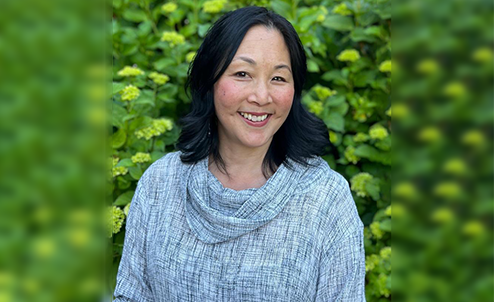
Carolyn Wing
Intercultural Specialist
*Carolyn is currently seconded to Langara's Applied Research Centre (ARC).
Hello! My name is Carolyn Wing and I use the pronouns she/her for myself.
Bio
I am 3.5 generation Chinese-Canadian. My maternal grandmother was born in Cumberland on Vancouver Island and my other three grandparents emigrated from Guangzhou, China which is the city formerly named Canton by colonizers (therefore we are Cantonese). Apparently, my true surname is Ng but when my paternal grandfather arrived in Canada it was recorded as Wing so similarly to many immigrants, we had to sort out the true last name business in later generations.
My roots
My maternal grandparents were segregated in Vancouver’s Chinatown and my mother, and her siblings were born in a house in that neighbourhood. When my paternal grandparents immigrated to Canada, my grandfather insisted that my grandmother renounce everything Chinese and become a Methodist. My grandmother was able to hide a few pieces of Chinese jewelry and a dress in her trunk from China before they sailed off to settle in Kamloops, BC.
My grandfather started out as a domestic servant but was able to eventually purchase property, a farm with orchards, and run a grocery store. My father and his siblings, born from about 1920-1930, were perhaps part of the first generation of the model minority. It is documented that my uncle Peter Wing was groomed by the church and groups such as the Lions and Soroptimist Clubs to demonstrate that “the Chinese” were model citizens and could assimilate. Indeed, he was successful as in the 1960’s he was elected mayor of the city of Kamloops and was the first mayor in North America of Chinese ancestry. There haven’t been that many since!
My parents both faced racism and discrimination in the early years of their professions. My father was one of the first practicing Chinese Canadian pharmacists. He was forced to leave his home and travel to small communities like Dawson Creek and Prince George in the 1950’s for work as no one would hire him in Vancouver. My mother, born in 1933, was unable to find employment in Vancouver as a teacher for several years until eventually she became the third Chinese-Canadian teacher to be hired in the Vancouver School district in the 1950s.
People of Chinese ancestry, even those born in Canada were not considered Canadian Citizens until 1947. Therefore, my father, who was born in Kamloops, BC in 1925 was not considered a Canadian Citizen until he was 22 years old!
In society
I grew up in an upper middle class neighborhood in Vancouver on the unceded traditional and contemporary territories of the xʷməθkʷəy̓əm (Musqueam), Sḵwx̱wú7mesh (Squamish), and səlilwətaɬ (Tsleil-Waututh) Nations.
Despite always living in the lower mainland and deeply valuing this amazing part of the Earth and being grateful to the ancestral stewards of it, I still do not feel a sense of place here. I attribute this to being part of the diaspora of Chinese Canadians – I still don’t really fit here but I definitely don’t fit in China either! I do not speak Mandarin or Cantonese and practice mostly only food aspects of Chinese-Canadian culture.
Despite this lack of feeling a sense of place, being a woman and still being considered a visible minority, I definitely have more privilege than most. I am CIS gender, heterosexual, middle class, a property owner, and an English speaker with a secure full-time position of employment and a pension!
My work
I am a permanent part-time faculty in the Early Childhood Education department and a permanent part- time consultant in the Office of Equity, Diversity, and Inclusion. Currently, I am seconded to the Applied Research Centre as I work on a research project funded by Employment and Social Development Canada entitled, Innovating Virtual Reality in Inclusive and Anti-biased ELCC Training.
Early Childhood Education is a field that has always had a social justice focus. The sector has advocated for inclusive free education and childcare for all as well as pay equity to a workforce that is dominated by women and more commonly now, immigrant women. My current project looks at how new technology can support our college students’ learning to become socially just early childhood educators through developing empathy and anti-biased and anti-racist actions within their practice with young children.
